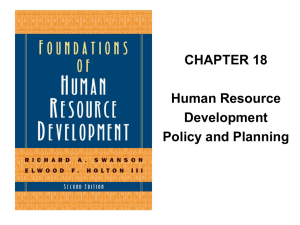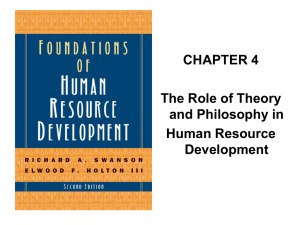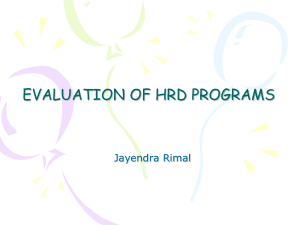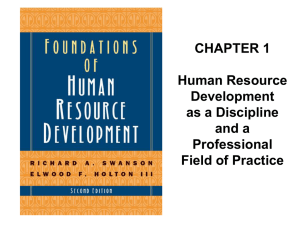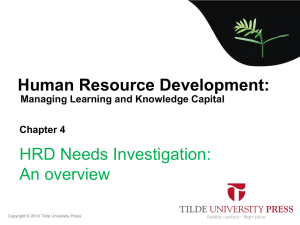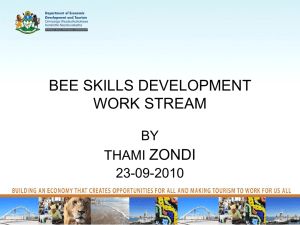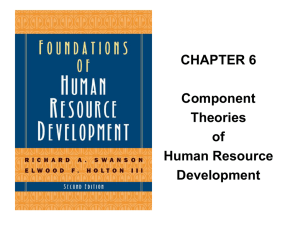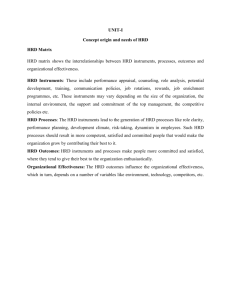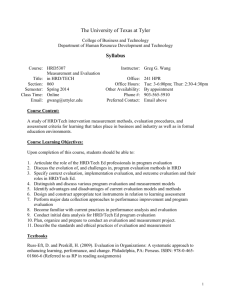PSC 615 - Letrent-Jones - The University of North Carolina at
advertisement
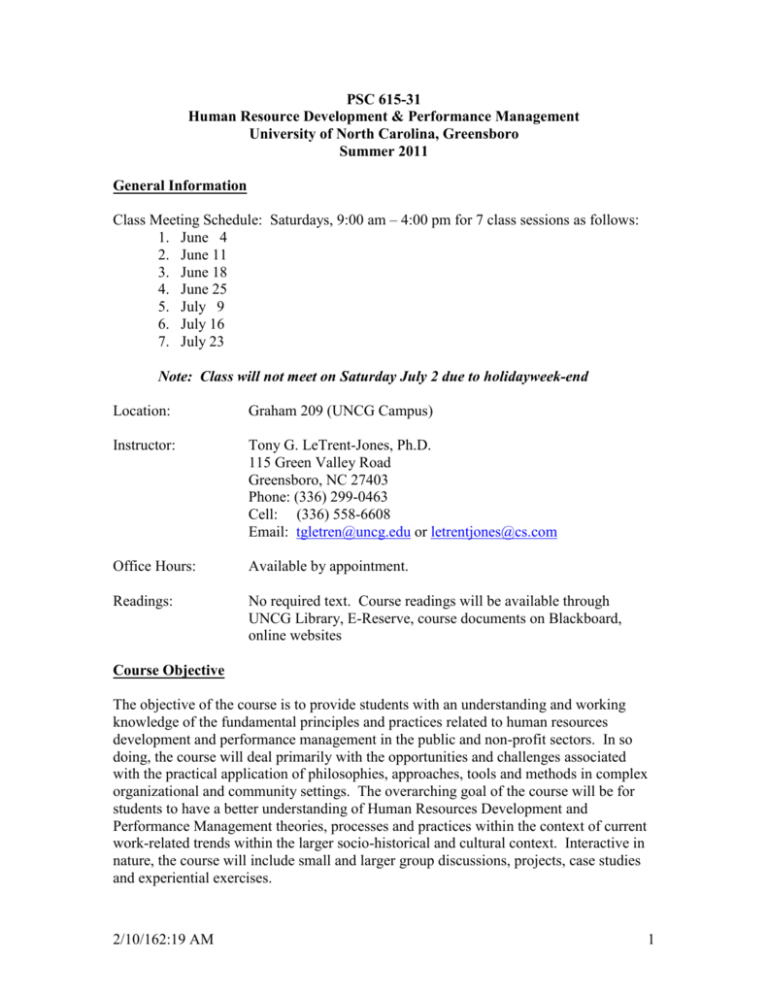
PSC 615-31 Human Resource Development & Performance Management University of North Carolina, Greensboro Summer 2011 General Information Class Meeting Schedule: Saturdays, 9:00 am – 4:00 pm for 7 class sessions as follows: 1. June 4 2. June 11 3. June 18 4. June 25 5. July 9 6. July 16 7. July 23 Note: Class will not meet on Saturday July 2 due to holidayweek-end Location: Graham 209 (UNCG Campus) Instructor: Tony G. LeTrent-Jones, Ph.D. 115 Green Valley Road Greensboro, NC 27403 Phone: (336) 299-0463 Cell: (336) 558-6608 Email: tgletren@uncg.edu or letrentjones@cs.com Office Hours: Available by appointment. Readings: No required text. Course readings will be available through UNCG Library, E-Reserve, course documents on Blackboard, online websites Course Objective The objective of the course is to provide students with an understanding and working knowledge of the fundamental principles and practices related to human resources development and performance management in the public and non-profit sectors. In so doing, the course will deal primarily with the opportunities and challenges associated with the practical application of philosophies, approaches, tools and methods in complex organizational and community settings. The overarching goal of the course will be for students to have a better understanding of Human Resources Development and Performance Management theories, processes and practices within the context of current work-related trends within the larger socio-historical and cultural context. Interactive in nature, the course will include small and larger group discussions, projects, case studies and experiential exercises. 2/10/162:19 AM 1 Teaching Philosophy My philosophy of and approach to education is one of Participatory Action Learning (PAL). Working from that framework, I believe education is a process of theoretical, practical and personal discovery that, while facilitated by someone formally designated as a “teacher”, “professor” or “instructor”, is a collaborative process in which students and teacher share in the responsibility for co-creating a meaningful learning experience for all involved. Central to my teaching philosophy is a commitment to student-centeredness grounded in a scholar-practitioner model the guiding purpose of which is to help develop mindful learners and practitioners capable of critical reflection that informs effective action and contributes to personal and professional growth and development. With these goals in mind, class participation in which students are actively involved in the design and delivery of the course content as well as in which they share, discuss and reflect upon their own experiences, thoughts and insights on a regular basis is essential to the learning experience. Course Requirements & Grading Grade Components & Values: 1. Attendance, Preparation & Participation 2. Interview, Paper, Presentation & Discussion 3. Special Topic Paper, Presentation & Discussion 4. Team Project (Case Study & Discussion) 5. Capstone Paper 25% 15% 15% 20% 25% 100% Attendance, Preparation & Participation: 25% Attendance* Reading assigned materials Active participation in class discussions & activities Constructive contribution to class discussions & overall learning experience *Note: Due to the limited number and length of class sessions and the design of the course, attendance is critical to individual performance and successful completion of the course as well as contribution to the learning of student colleagues. Therefore, attendance of all class sessions is a requirement of the course. If, however, an absence cannot be avoided, prior notification to instructor and project teammates is expected. If prior notification is not possible, then notification as soon after the absence as possible is expected. While technically 25% of the course grade is related to attendance, a total of 3 absences overall or 2 in succession will automatically result in an “F” or an incomplete for the course. 2/10/162:19 AM 2 Interview(s), Reflective Paper, Presentation & Discussion: 15% (10% Presentation & Discussion – 5% Paper) Interview at least 1 person about her/his experience with and perspective on HRD and/or PM. The person can either be a HRD/HRM professional, a manager, executive or employee or combination thereof. Write a brief reflective paper (2-3 double-spaced pages) on the interview in relation to your own experience and perspective and what we have been reading and discussing in course. Present findings and lead class in discussion (15 minutes: 5-10 minutes presentation, 10 minutes discussion) Special Topic Research & Paper, Presentation & Discussion: 15% (10% Presentation & Discussion – 5 % Paper) Select and read 1 book or 2-3 journal articles (from resource list or approved by instructor) on a topic of interest to you (see topic list) Prepare brief written summary (3-4 double-spaced pages) Present overview and lead class in discussion (20 minutes: 10 minutes presentation, 10 minutes discussion) Team Project (Case Study): 20% (10% Case & Discussion Questions – 10% Discussion) Develop a case study of some aspect of HRD &PM Create written case document (with copies for all class members & instructor) Prepare discussion questions Lead class in reading, analysis & discussion of case (Time TBD based on number of teams/cases) Capstone Paper: 25% A 4-6 page (double-spaced) paper reflecting on the course including readings, interviews, class discussions, cases and experience working with team on case study project. While reflective in nature, the paper should include at least 3 secondary source citations/references. *Note re: papers All papers should be of graduate level quality and as such should be well-written utilizing appropriate formatting, spelling, grammar, and sentence and paragraph structure with proper references to source materials cited or consulted using latest APA guidelines. The writing should be clear and concise and demonstrate your knowledge of the topic as well as your critical thinking, analytical and reflective competencies. Grading: The following grading scale will be used in this course: A+ (100) 100-96 B+ (89) 89-86 C+ (79) 79-76 A (95) 95-93 B (85) 85-83 C (75) 75-73 A- (90) 92-90 B- (80) 82-80 C- (70) 72-70 2/10/162:19 AM F (69) 69-0 3 PSC 615-31: Human Resource Development & Performance Management UNCG – Summer 2011 Course Outline Class 1: June 4 Course Overview & Introduction to HRD&PM Introductions Course Overview Syllabus Review & Discussion “Getting Started: HRD&PM in Personal Context” Class 2: June 11 Perspectives on HRD & PM HRD&PM in Historical, Social & Cultural Perspective Overview/Survey of the Field/Lit Review Readings: de Bruijin, Chapter 1; Gilley & Maycunich, Chapters 1 & 2. Class 3: June 18 HRD & PM in Practice: Part 1 Student Interview Presentations & Discussion Readings: Gilley & Maycunich, Chapters 4 & 9; Grote pp. 2-7. Class 4: June 25 The HRD&PM Landscape Management & Leadership Development Performance Appraisal as Component of HRD&PM Readings: Gilley & Maycunich, Chapters 6 & 7 Class 5: July 9 HRD & PM in Practice: Part 2 Student Special Topic Presentations and Discussion Class 6: July 16 HRD & PM in Practice: Part 3 Succession Planning & Management Goals, Process, Challenges, Benefits Theory & Practice Case Studies – Teams Class 7: July 23 Course Review & Summary Critical Perspectives on HRD/HRM/PM Course Review via Discussion & Exercises Course Evaluations Student Capstone Papers Due 2/10/162:19 AM 4 Topics The following are topics that will be covered in the course to varying degrees of emphasis and detail. This list may also be used for selection of special topic papers & presentations: Aligning pay and performance Balanced Scorecard Career development planning Coaching Compensation and performance appraisal Computer based training (CBT) Definition and stages of careers Diversity Educational assistance programs Employee development Employee retention Fast tracking/high potentials Generational differences in the workforce/workplace Human resource development, performance management and organizational strategy Human resource development and human resources management Legal implications of performance appraisal Management by Objectives (MBO) Mid-career transitions Mentoring Motivation Organization Development Organizational Learning/Learning Organizations Pay-for-Performance Performance evaluation systems Performance management and evaluation of teams Performance appraisal systems Performance standards Performance analysis Performance feedback Professional associations Resumes Succession planning Systems Thinking Trends in performance appraisal Workforce trends 360-degree feedback 2/10/162:19 AM 5
